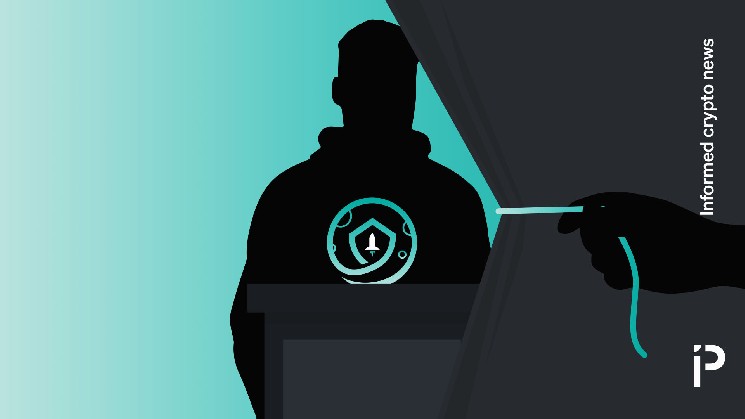The criminal trial of former SafeMoon CEO Braden John Karony started at a sprint today, moving swiftly from opening statements and testimony from a victim who lost $20,000, to a surprisingly early appearance from the prosecution’s star witness, Thomas “Papa” Smith.
Papa, former CTO of SafeMoon, has pleaded guilty to the same money laundering, securities fraud, and wire fraud charges that Karony faces, and testified against his former gaming buddy in hopes of reducing his eventual sentence.
Both the highs and lows of the day belonged to Nicholas Smith (no relation to Thomas), Karony’s relentless and combative defense attorney.
Karony is alleged to have represented SafeMoon’s liquidity pool on the PancakeSwap DEX as “locked,” or impossible to withdraw — even as he was withdrawing millions of dollars.
Nicholas Smith, who resembles a much smaller version of Saturday Night Live alum Chris Parnell, meticulously interrogated witnesses in pursuit of a clear agenda: demonstrating that SafeMoon investors should have been aware that millions of dollars were being removed, and that Karony was, in fact, transparent throughout.
Nicholas Smith’s clear commitment was surprising, given that the lawyer was appointed only after a prior team, from the firm Petrillo, Klein, & Boxer, withdrew after Karony failed to pay them.
Per prior court proceedings, Nicholas Smith is seemingly being paid under the Criminal Justice Act, which provides representation for defendants unable to afford it.
Karony’s team is small but ‘ferociously competent’
The bare-bones nature of the defense was clear in the courtroom, with Smith, Karony, and a single legal aide sitting at the defense table, across from a prosecution team of five lawyers, investigators, and aides.
Smith immediately came across as ferociously competent — certainly more focused and determined than former FTX head Sam Bankman-Fried’s silver-spoon defense team. Indeed, Mark Cohen and Christian Everdell’s listless efforts left some observers wondering if they were intentionally throwing the case.
Smith’s intensity had its downsides, though: near the end of the day, in the course of a procedural dispute with prosecutors over the redaction of witness documents, he became combative and was rebuked by Judge Eric Komitee — who, for his part, looks uncannily like Ben Affleck.
Read more: Sam Bankman-Fried lied to FTX lawyers about using customer funds
SafeMoon die-hard thinks Karony was ‘framed’
SafeMoon skyrocketed to notoriety in early 2021, as the broader crypto sector was boiling with excitement — and scams.
Wiser crypto heads were derisive of the project, which purported to protect its price by imposing a steep 10% penalty on anyone selling or transferring tokens. It also boasted a supposedly “locked” liquidity pool.
But in the crypto frenzy of the moment, SafeMoon attracted as many as 2 million investors, many of them new arrivals to crypto. The project collapsed after massive withdrawals from the liquidity pool were discovered by blockchain sleuths, but it nevertheless retains a dedicated core of adherents.
At least one of those die-hards was in attendance at the trial today at the Eastern District of New York courthouse near downtown Brooklyn, where heavy fog rendered the city temporarily more like Portland than Gotham.
Going by SafeMoonNov, or SMNov, the supporter arrived wearing a SafeMoon-branded hoodie, and, like other persistent supporters, said he believes Karony’s defense that these withdrawals didn’t contradict the project’s representations.
He believes Karony is being “framed,” perhaps by the government itself, because it regards SafeMoon’s technology as a threat.
Was SafeMoon safe? It’s in the name
The government’s opening statements didn’t indicate whether SafeMoon posed a threat to US security and stability. Instead, lead attorney Jess Weigel argued that Karony “lied to investors so he could get rich,” adding, “he told them [SafeMoon] was safe. It was right there in the name.”
Prosecutors will seek to show that Karony “controlled everything,” and with help from his co-conspirators, drained “tens of millions” of dollars from SafeMoon’s liquidity pools, which was spent on “Porsches, multiple Audi R8s, and real estate.”
The opening statement for the defense opened with Karony’s background as a “former intelligence analyst and combat veteran.” Karony’s claims to be a “veteran” have been controversial: records show he served in the Utah National Guard.
Karony’s role as an intelligence analyst is part of a family tradition — his father, Bradford Karony, is a former CIA officer.
Smith called on the jury to consider two questions as the trial moved forward. First, whether Karony “agreed with someone else to deceive someone,” or whether he “repeatedly disclosed the information he’s accused of hiding?”
Second, did the team agree? Or did they consistently disagree?
“If it’s the second,” Smith pointed out, “you have to ask yourself … is that a conspiracy?”
Smith further previewed arguments to the effect that deceptive statements about SafeMoon had been written by other team members, including founder Kyle Nagy, before Karony joined the team.
Before Karony joined SafeMoon, Smith said, he knew “next to nothing about cryptocurrency or liquidity pools.” Nagy, who was charged alongside Karony and Thomas Smith, is believed to be on the lam in Russia.
Read more: YouTuber Ben Phillips made $12M from SafeMoon crypto pump and dump scheme
Prosecution witness struck nearly dumb
The prosecution’s first witness was William Maurer, a 43-year-old architect who invested around $20,000 in SafeMoon, mostly between May and October of 2021.
Maurer walked prosecutors through his decision to invest after reading the SafeMoon whitepaper — which claimed “100% safety,” and stated that the SafeMoon Liquidity Pool would be “locked… for four years.”
SafeMoon was the first cryptocurrency Maurer invested in, making a loss of more than 95% of his initial investment.
In Nicholas Smith’s cross-examination, he sought to highlight that many of the communications that convinced Maurer didn’t come from Karony himself, but from the broader executive team — in some cases, before Karony joined the project.
Smith also sought to sow confusion about the exact meaning of a “locked” liquidity pool, asking Maurer about buying SafeMoon through the Bitmart exchange in addition to purchases through the PancakeSwap DEX.
“It sounds like you understand that buying on Bitmart implies that the liquidity pool wasn’t entirely locked?” Smith asked the victim. “Did the whitepaper lay out a rule that the tokenomics would work on a centralized exchange?”
In walking Maurer back through the SafeMoon whitepaper, Smith honed in on the phrase “in theory” in one description, asking whether the phrase pointed to “what would happen” or merely “what could happen.”
Maurer, clearly no expert, was struck nearly dumb by the flurry of logic-chopping.
The day’s second witness was Dr. John M. Griffin, presented as an expert and largely tasked by prosecutors with running the jury through basic blockchain terminology and concepts — not just wallets and addresses, but liquidity pools and LP tokens.
It’s hard to imagine laymen following much of this, one of the real challenges faced by both sides in the case. (Griffin was previously the author of a paper that claimed to demonstrate the printing of unbacked Tether tokens was being used to manipulate the price of bitcoin.)
Smith’s cross-examination of Griffin seemed largely aimed at establishing that blockchains are transparent and easily readable. “When liquidity is withdrawn from a liquidity pool, could someone see that?” Smith asked.
He also asked about the benefits of listing a token on centralized exchanges, seemingly working to show that sending coins from the SafeMoon liquidity pool to an exchange was for the good of SafeMoon users.
Star witness ‘Papa’ Smith says Karony defrauded him
Finally came the closest thing the case has to a star witness, Thomas “Papa” Smith, 36. Smith served as CTO of SafeMoon for less than a year, but was one of its most well-known public faces, with a convincing cyberpunk-weirdo beard and kooky New Hampshire home base.
But the Papa who appeared to testify against his former CEO was subdued and polite, and the past four years had clearly taken a toll: his long hair and trademark beard had gone from black to almost entirely grey.
Papa only served as CTO of SafeMoon for about nine months, from March to November of 2021, before departing voluntarily.
He testified that he, Karony, and Nagy “would regularly discuss how we would structure responses to the public” to conceal or deflect from their withdrawals from the liquidity pool.
Smith also testified that Karony had defrauded him, claiming that Papa owned 10% of the firm that ran SafeMoon, only to deny that ownership stake later.
Papa Smith’s testimony closed out the day, sure to be followed by a vigorous cross-examination from Nicholas Smith on Wednesday. The trial is estimated to run until May 26, with the prosecution estimating today that it would finish its case by May 14.
Trials are all about juries
The defense seems to have a substantial witness list of its own, including Rutgers economics professor Ben Mizrach as an expert witness, and at least one personal friend of Karony’s poised to testify.
During jury selection, jurors were also informed that Karony’s parents, Bradford and Jennifer Karony, would be topics at trial. That suggests a light may be shone on a notorious incident when Karony seemed poised to sue his own mother, after she sought to keep him at a distance from a development project in the Gambia.
John Karony reputedly tried to use an investment in his mother’s firm to claim its work as part of SafeMoon’s portfolio.
Read more: Soulja Boy tweets $24K pay-to-play deal with SafeMoon clone — then deletes it
This and other alleged examples of Karony’s impulsive and strange behavior haven’t really been highlighted at trial yet, and generally, the prosecution has been extremely cautious about its claims.
One hopes for their sake they’re just getting warmed up — trials are all about juries, and so far, Nicholas Smith is winning the game of theatre at a walk.



